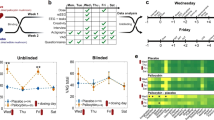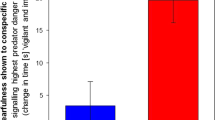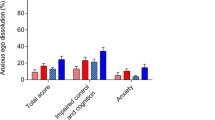Abstract
PROGESTERONE acting in the female seems to reduce sexual interaction in several primate species. It has been reported that sexual activity declines during the luteal phase of the menstrual cycle (when circulating progesterone levels are maximal), in monkeys1–3, lowland gorillas4 and humans5, and that administering progesterone to ovariectomised, oestrogen-treated rhesus monkeys has a similar effect6. A major unresolved question is how progesterone causes these changes in behaviour. One possibility is that progesterone acts on the female's central nervous system, causing her to accept or solicit fewer male mounts. Another is that progesterone somehow alters the vagina thereby changing non-behavioural cues (such as a smell7 or tactile qualities) which contribute to her sexual attractiveness. Here we present evidence favouring the second mechanism, since the reduction in sexual interaction caused by systemic administration of a physiological dose of progesterone to female monkeys could be reproduced by instilling very small amounts of this hormone directly into the vagina.
This is a preview of subscription content, access via your institution
Access options
Subscribe to this journal
Receive 51 print issues and online access
$199.00 per year
only $3.90 per issue
Buy this article
- Purchase on Springer Link
- Instant access to full article PDF
Prices may be subject to local taxes which are calculated during checkout
Similar content being viewed by others
References
Michael, R. P., and Zumpe, D., J. Reprod. Fert., 21, 199–201 (1970).
Bullock, D. W., Paris, C. A., and Goy, R. W., J. Reprod. Fert., 31, 225–236 (1972).
Saayman, G. S., Folio Primat., 12, 81–110 (1970).
Nadler, R. D., Science, 189, 813–814 (1975).
Udry, J. R., Morris, N. M., and Waller, L., Arch. sex. Behav., 2, 205–214 (1973).
Michael, R. P., Saayman, G. S., and Zumpe, D., J. Endocr., 41, 421–431 (1968).
Michael, R. P., Keverne, E. B., and Bonsall, R. W., Science, 172, 964–966 (1971).
Knobil, E., Rec. Prog. Hormone Res., 30, 1–46 (1974).
Everitt, B. J., Herbert, J., and Hamer, J. D., Physiol. Behav., 8, 409–415 (1972).
Michael, R. P., and Zumpe, D., Behaviour, 36, 168–186 (1970).
de Jong, F. H., Baird, D. T., and van der Molen, H. J., Acta Endocr., 77, 575–587 (1974).
Keverne, E. B., in Advances in the Study of Behaviour, 7 (edit. by J. S. Rosenblatt), (Academic, in the press).
Brenner, R. M., Resko, J. A., and West, N. B., Endocrinology, 95, 1094–1104 (1974).
Eaton, G. G., in Primate Reproductive Behaviour (edit. by Phoenix, C. H.), 20–35 (Karger, Basel, 1973).
Author information
Authors and Affiliations
Rights and permissions
About this article
Cite this article
BAUM, M., EVERITT, B., HERBERT, J. et al. Reduction of sexual interaction in rhesus monkeys by a vaginal action of progesterone. Nature 263, 606–608 (1976). https://doi.org/10.1038/263606a0
Received:
Accepted:
Issue Date:
DOI: https://doi.org/10.1038/263606a0
This article is cited by
-
On the correlation between sexual behavior and ovarian hormone level during the menstrual cycle in captive Japanese monkeys
Primates (1979)
-
Hormonal basis of proceptivity and receptivity in female primates
Archives of Sexual Behavior (1977)
Comments
By submitting a comment you agree to abide by our Terms and Community Guidelines. If you find something abusive or that does not comply with our terms or guidelines please flag it as inappropriate.



